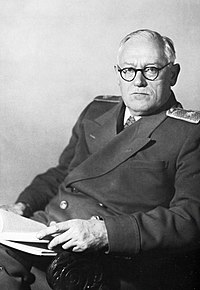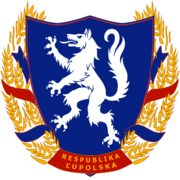Anton Marusić: Difference between revisions
No edit summary |
No edit summary |
||
| Line 34: | Line 34: | ||
}} | }} | ||
'''Anton Marusić''' (1 October 1885 – 2 June 1948) was a [[Luepola|Luepolan]] politician who served as the leader of the [[People's Republic of Luepola]] from 1936 until his death in 1948. Despite not having previously served as a deputy chairman, Marusić was elected in an emergency [[ | '''Anton Marusić''' ({{IPA-lupl|anˈtɔn maˈɾusic|lang}}1 October 1885 – 2 June 1948) was a [[Luepola|Luepolan]] politician who served as the leader of the [[People's Republic of Luepola]] from 1936 until his death in 1948. Despite not having previously served as a deputy chairman, Marusić was elected in an emergency [[Communist Party of Luepola|Communist]] convention upon the unexpected death of his predecessor, [[Stanislav Kolar]]. Shortly after beginning his rule, Marusić increased arms production in Luepola significantly, emboldened by the rapid militarization of his allies in Apelia and [[Granzery]]. Marusić's continuation of Kolar's policy of exporting Flecquism hastened the growing rift between Luepola and her allies, and the [[Aitic Union]], resulting in the expulsion of the latter from the [[Socialist Internationale]] in 1940. Marusić's efforts resulted in the Communists' rise to power in [[Vorochia]] in 1939. | ||
Marusić personally approved of the [[Invasion of Zacotia]], which began the [[Great War (Vasarden)|Great War]]. Marusić led the [[Socialist International Coalition|Communist war effort]] alongside his Apelian counterpart, [[Abel Mallaire]], against the [[Allianz (Vasarden)|Allied powers]]. As both the war effort and his health deteriorated, Marusić remained in the chairmanship, continuing to fight the war after Apelia and Granzery had surrendered. He was present at the [[Battle of Prishek]], remaining within the Party headquarters as Vierz forces gained ground. On 2 June 1948, over his final radio broadcast, he permitted the [[Luepolan People's Army|military]] to stand down and surrender at their discretion, and announced [[Saňin Mlakar]] as his successor. He was killed by Vierz forces less than an hour later as they stormed the party headquarters. | Marusić personally approved of the [[Invasion of Zacotia]], which began the [[Great War (Vasarden)|Great War]]. Marusić led the [[Socialist International Coalition|Communist war effort]] alongside his Apelian counterpart, [[Abel Mallaire]], against the [[Allianz (Vasarden)|Allied powers]]. As both the war effort and his health deteriorated, Marusić remained in the chairmanship, continuing to fight the war after Apelia and Granzery had surrendered. He was present at the [[Battle of Prishek]], remaining within the Party headquarters as Vierz forces gained ground. On 2 June 1948, over his final radio broadcast, he permitted the [[Luepolan People's Army|military]] to stand down and surrender at their discretion, and announced [[Saňin Mlakar]] as his successor. He was killed by Vierz forces less than an hour later as they stormed the party headquarters. | ||
| Line 44: | Line 44: | ||
[[Category:Luepola]] | [[Category:Luepola]] | ||
[[Category:Leaders of Luepola]] | [[Category:Leaders of Luepola]] | ||
{{Luepola Topics}} | |||
Revision as of 21:57, 2 April 2020
This article is incomplete because it is pending further input from participants, or it is a work-in-progress by one author. Please comment on this article's talk page to share your input, comments and questions. Note: To contribute to this article, you may need to seek help from the author(s) of this page. |
Anton Marusić | |
|---|---|
 | |
| Chairman of the Communist Party of Luepola | |
| In office 10 August 1936 – 2 June 1948 | |
| Premier | Đuro Karević Valent Jugovać Saňin Mlakar |
| Preceded by | Stanislav Kolar |
| Chairman of the Socialist Internationale | |
| In office 20 February 1947 – 2 June 1948 | |
| Preceded by | Abel Mallaire |
| Succeeded by | Saňin Mlakar (Acting) |
| Personal details | |
| Born | 1 October 1885 Beuje, Aneska, Luepola |
| Died | 2 June 1948 (aged 62) Prishek, People's Republic of Luepola |
| Alma mater | Grast Institute of Arts and Sciences |
| Military service | |
| Allegiance | |
| Branch/service | |
| Years of service | 1936-1948 |
| Battles/wars | Great War |
Anton Marusić (Luepolan: [anˈtɔn maˈɾusic]1 October 1885 – 2 June 1948) was a Luepolan politician who served as the leader of the People's Republic of Luepola from 1936 until his death in 1948. Despite not having previously served as a deputy chairman, Marusić was elected in an emergency Communist convention upon the unexpected death of his predecessor, Stanislav Kolar. Shortly after beginning his rule, Marusić increased arms production in Luepola significantly, emboldened by the rapid militarization of his allies in Apelia and Granzery. Marusić's continuation of Kolar's policy of exporting Flecquism hastened the growing rift between Luepola and her allies, and the Aitic Union, resulting in the expulsion of the latter from the Socialist Internationale in 1940. Marusić's efforts resulted in the Communists' rise to power in Vorochia in 1939.
Marusić personally approved of the Invasion of Zacotia, which began the Great War. Marusić led the Communist war effort alongside his Apelian counterpart, Abel Mallaire, against the Allied powers. As both the war effort and his health deteriorated, Marusić remained in the chairmanship, continuing to fight the war after Apelia and Granzery had surrendered. He was present at the Battle of Prishek, remaining within the Party headquarters as Vierz forces gained ground. On 2 June 1948, over his final radio broadcast, he permitted the military to stand down and surrender at their discretion, and announced Saňin Mlakar as his successor. He was killed by Vierz forces less than an hour later as they stormed the party headquarters.
He was charged for numerous war crimes by the Allied powers at the first meeting of the International Assembly, particularly for his agency in the Bombing of Talheim, and was posthumously tried and convicted for these charges in 1949.
